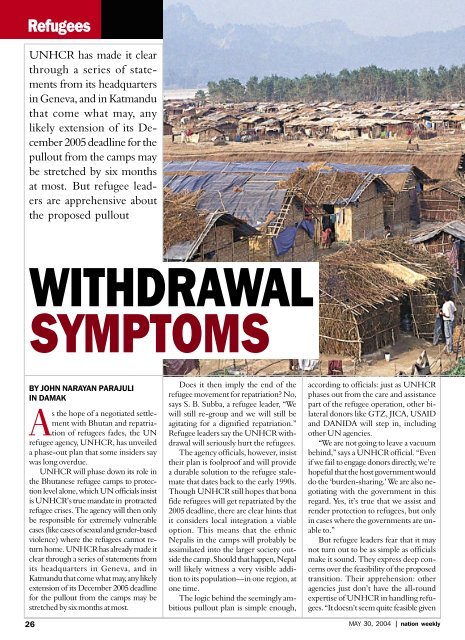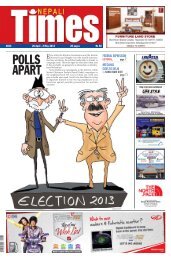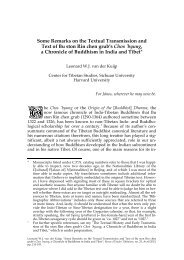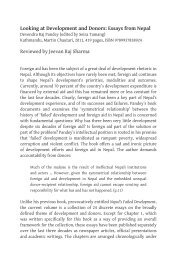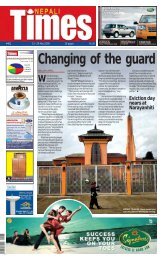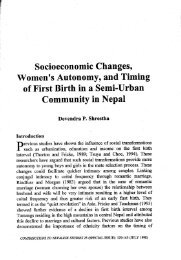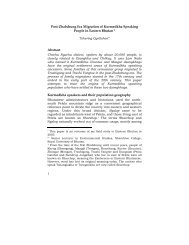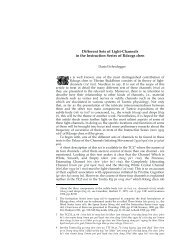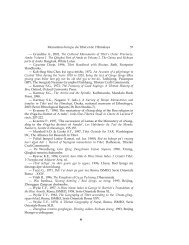You also want an ePaper? Increase the reach of your titles
YUMPU automatically turns print PDFs into web optimized ePapers that Google loves.
Refugees<br />
UNHCR has made it clear<br />
through a series of statements<br />
from its headquarters<br />
in Geneva, and in Katmandu<br />
that come what may, any<br />
likely extension of its December<br />
2005 deadline for the<br />
pullout from the camps may<br />
be stretched by six months<br />
at most. But refugee leaders<br />
are apprehensive about<br />
the proposed pullout<br />
WITHDRAWAL<br />
SYMPTOMS<br />
BY JOHN NARAYAN PARAJULI<br />
IN DAMAK<br />
As the hope of a negotiated settlement<br />
with Bhutan and repatriation<br />
of refugees fades, the UN<br />
refugee agency, UNHCR, has unveiled<br />
a phase-out plan that some insiders say<br />
was long overdue.<br />
UNHCR will phase down its role in<br />
the Bhutanese refugee camps to protection<br />
level alone, which UN officials insist<br />
is UNHCR’s true mandate in protracted<br />
refugee crises. The agency will then only<br />
be responsible for extremely vulnerable<br />
cases (like cases of sexual and gender-based<br />
violence) where the refugees cannot return<br />
home. UNHCR has already made it<br />
clear through a series of statements from<br />
its headquarters in Geneva, and in<br />
Katmandu that come what may, any likely<br />
extension of its December 2005 deadline<br />
for the pullout from the camps may be<br />
stretched by six months at most.<br />
26<br />
Does it then imply the end of the<br />
refugee movement for repatriation? No,<br />
says S. B. Subba, a refugee leader, “We<br />
will still re-group and we will still be<br />
agitating for a dignified repatriation.”<br />
Refugee leaders say the UNHCR withdrawal<br />
will seriously hurt the refugees.<br />
The agency officials, however, insist<br />
their plan is foolproof and will provide<br />
a durable solution to the refugee stalemate<br />
that dates back to the early 1990s.<br />
Though UNHCR still hopes that bona<br />
fide refugees will get repatriated by the<br />
2005 deadline, there are clear hints that<br />
it considers local integration a viable<br />
option. This means that the ethnic<br />
Nepalis in the camps will probably be<br />
assimilated into the larger society outside<br />
the camp. Should that happen, Nepal<br />
will likely witness a very visible addition<br />
to its population—in one region, at<br />
one time.<br />
The logic behind the seemingly ambitious<br />
pullout plan is simple enough,<br />
according to officials: just as UNHCR<br />
phases out from the care and assistance<br />
part of the refugee operation, other bilateral<br />
donors like GTZ, JICA, USAID<br />
and DANIDA will step in, including<br />
other UN agencies.<br />
“We are not going to leave a vacuum<br />
behind,” says a UNHCR official. “Even<br />
if we fail to engage donors directly, we’re<br />
hopeful that the host government would<br />
do the ‘burden-sharing.’ We are also negotiating<br />
with the government in this<br />
regard. Yes, it’s true that we assist and<br />
render protection to refugees, but only<br />
in cases where the governments are unable<br />
to.”<br />
But refugee leaders fear that it may<br />
not turn out to be as simple as officials<br />
make it sound. They express deep concerns<br />
over the feasibility of the proposed<br />
transition. Their apprehension: other<br />
agencies just don’t have the all-round<br />
expertise of UNHCR in handling refugees.<br />
“It doesn’t seem quite feasible given<br />
MAY 30, 2004 | nation weekly


